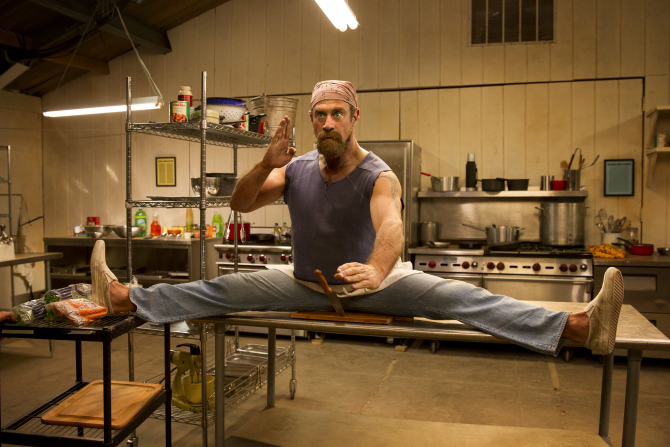 I’m either a comedian who moonlights as a union organizer or a union organizer who moonlights as a comedian; I kind of can’t tell anymore. Consequently, other comedians often ask me how we can form a union. The question they’re really asking is not “How do I pay dues and get a union contract?” The underlying question really is “How do we get a better deal in the unending murder-suicide pact of show business?”
I’m either a comedian who moonlights as a union organizer or a union organizer who moonlights as a comedian; I kind of can’t tell anymore. Consequently, other comedians often ask me how we can form a union. The question they’re really asking is not “How do I pay dues and get a union contract?” The underlying question really is “How do we get a better deal in the unending murder-suicide pact of show business?”
Unions are defined by law as collectively bargained, democratically-ratified, legally-enforceable contracts covering wages, benefits, and working conditions. They are defined by pop culture as corrupt and/or irrelevant. Comedians who are already in SAG-AFTRA or the WGA can participate in them to make them better.
On the other hand, as comedians there is a vast sprawling expanse of our creative work that is as yet uncovered by existing unions. Standards are all over the map for our podcasts, stand-up, writing, videos, hosting “talent shows” at the Elk’s Lodge. Even when we get a gig with a contract, we hope someone else has our best interests in mind who will tell us what it means. Or we do the gig with a fist bump as the contract and pray for the best.
This is bullshit. Until we figure out what the United Comedians of America will do, we can be smarter about our contracts.
Here are a few tips on contracts that may make your life better:
-
Get the contract at the beginning, when everyone is excited about working together. When things go great, of course it seems like we don’t need a contract. Contracts are for when our relationships turn to rubbish or there’s a misunderstanding. But it is wayyyy easier to make a legal document when we’re friends than it is after the shit hits the fan and you actually need it. As an analogy, if you’re about to do the nasty, and pull out a condom, and the other person gets weird about it, then you may not want to hump them. Maybe you only do oral. If the first time you have sex with somebody, they bust out something hella weird and creepy, you may think twice about doing it again. Same with contracts. A contract is foreplay to check out a partner before you’re in an ongoing business affair and they give you syphilis.
-
One of the irritating things about show business is that deals aren’t public, so transparency is a big problem for us. In union negotiations, workers can check other union contracts to see what’s normal. In political wheeling and dealing, everything is in the public record. But for comedy, there is no public record to tell us whether a deal is amazing or we’re being screwed. Nobody really knows the market or what an apples to apples comparison is. This means we need lawyers and agents and managers or wino prophets we trust—people who know the market. I hate negotiating without my own data, so my personal strategy is to do everything I can to narrow the range of issues where I have to hope I’m getting accurate advice from my lawyer.
-
In legal terms, a contract is a “meeting of the minds.” All that matters legally is whether the parties understood what they agreed to. That’s why it sucks for us as “talent” to not understand what we’re signing. Usually, the people who need to agree to the contract are not the people who write it—the first draft always comes from a legal template instead of the person I’m working with. For every contract, I create an email record to clarify the meaning, and then renegotiate so the language reflects what we’ve verbally agreed to. No one objects when I say, “This doesn’t reflect the conversation we just had. Let’s fix the language.”
-
Plan for worst-case scenarios. We Jews have spent millennia mastering the art of anticipating all the ways something can go horribly wrong. Comics are of course desperate to get to the being-funny part, but the more clearly we plan for the future, the better.
-
The most important parts of the contract are how it’s enforced and how you get out of it. Money is important, but we also need contracts in order to protect ourselves. Entertainment is filled with stories of artists who took the wrong person’s word and got paid in cocaine instead of royalties. The more airtight the enforcement of a deal is, the better. When you read a contract, what could it mean to sue over each part? How would it look, in a worst-case scenario, to a judge or an arbitrator? For example, if someone says that they “will” do something, that is a lot bigger commitment than if they say they “will make a good faith effort” to do it. It is nigh impossible to prove that someone didn’t make a good faith effort, but not hard to prove that they just didn’t do it. Enforcement also means making sure you have tools to enforce it, so language about when everybody has to do stuff and what information you’re entitled to is essential.
-
How a contract ends is critical. There’s no right answer; just know what you want. We often make a contract with somebody at a company, and then that person leaves and the dude who replaces them doesn’t like us. What happens if the deal is sold to another firm? Do they have to honor the old contract or do you get out of it? Can either side extend the contract, or terminate it, and how easy is that?
Now get out there and always be closing. Or never be closing if the deals suck. Or be taken advantage of. Or move to Europe and enjoy public arts funding and universal healthcare. Up to you.



Different comedians have different talent and experience levels and no venue or gig is the same. Comedians who have earned good pay have agents and managers that handle contracts. Keep your union off my pay check.
It would have to a voluntary opt-in for non-union comedy, which is why a professional association or foundation might be more practical than a formal bargaining agent. That said, comics could then start uploading depersonalized (redacted) contracts to build a national database from which to derive industry standards and prevailing wages, with member dues granting access.
Thanks! Incredibly read-able piece on the most basic guarantor of preserving your IP rights, compensation agreement, and working conditions.
Studying labor at the Joseph S. Murphy Institute at CUNY proved one the best investments in my career as a performer, writer, and indie producer, the last of which I learned how to do while adhering to a NUL (No Unpaid Labor) core mission even on non-union productions & shoots.
Would be cool if there was an equivalent of the National Writers Union (UAW Local 1981) for non-union comedy, as it provides excellent contract archives, prevailing wage, industry standards, blacklisted producing entity list, and IP right retention assistance to freelance writers for publication, like a Comedians’ Local 415/510. Perhaps structuring it as a professional association like the Editorial Freelancers Association, or foundation like Actor’s Fund with minimal sliding-scale annual dues based on annual income from non-union comedy, rather than forming as a bargaining agent if pros will join SAG-AFTRA or WGA anyway. Comedians Local 415/510? Not sure what international would even be appropriate, given that NWU has only one local for the entire country, and CSU/UC ASEs have one local for the state of CA through UAW. AGVA seems largely dead, but IATSE already represents bargaining units in Equity plays, SAG-AFTRA/WGA shoots, and major live theaters & concert halls FOH staff, security, and stage crew.
Comics with contractual minimums are the only paid performers on the UCB-NY & LA MainStages, which argue that as showcase venues for their training centers, everyone can be unpaid, which is challenging for Equity actors cast in sketches & Dramatists’ Guild sketch writers being produced. So that’s an incentive, given the rising frequency of entry to the industry based on work showcased at alternative comedy houses.
Improvisors, whose labor & artistic medium arguably remains marginal due to expectation of unpaid labor even on the country’s most prestigious stages, barring touring companies & cruises, face a situation created & perpetuated by producing improv/sketch houses not paying improvisors to perform for over 50 years. Many improvisations at Second City have been translated into sketches when the originating spontaneous actor/writer retired/left over the years, since copyright originates from earliest documented written iteration, and the theater explicitly retains the rights to all material developed in-house anyway. Likewise in NYC, it was not uncommon to see stand-ups short on material cribbing notes from improv jams & mixers, then using it as their own material, despite the overlap between those two communities in NYC. At this point, I capture all my sets on video & have audio-transcription software that generates a rough transcript, sometimes adapting the good bits into sketches, but I’m not sure that video alone would ensure copyright if ripped off by a comic.
I was given a contract by my manager tosign, i am a stand up comedian i want to make sure it legit or if you have an example of what a fair contract should look like